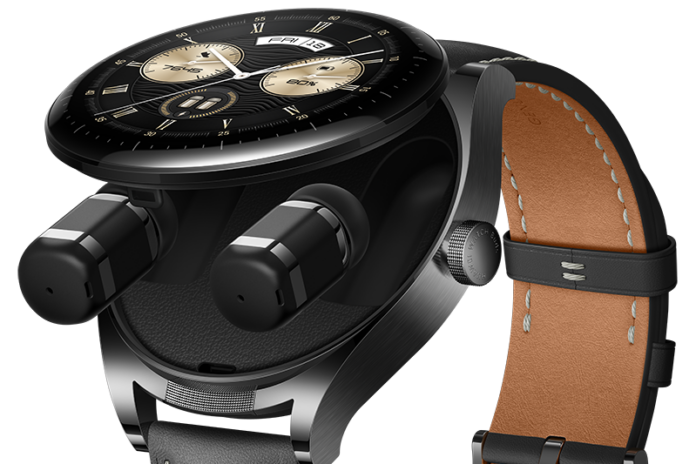When Huawei announced a smartwatch with headphones attached, we feared the useless and poorly crafted gadget. Surprise: The earphones of the Huawei Watch Buds are of very good quality, ingeniously hidden under the face of this watch. We obviously guess that this is a first draft that future versions will refine.
At first glance, the Huawei Watch Buds is a smartwatch similar to those designed by the Chinese manufacturer, all round with a 1.43-inch diameter color AMOLED screen. At 14.99mm, it’s a little thicker than a Huawei Watch GT 3 or GT Runner which are 11mm, rather comparable to the 14.4mm Apple Watch Ultra. Nothing monstrous, therefore, but not a champion of discretion.
But here it is, it has a secret, which you reveal by pressing a button at the bottom of the screen: inside are two Bluetooth headphones in the shape of pencil erasers, 21.8 mm long and each weighing 4 grams.
The connection with the phone is done rather smoothly with an iPhone, the Huawei Health application being accepted by the App Store. For Androids, you have to go through the Huawei site.
The first test, of course, is to assess the quality of these headphones, which are inserted deep into the ear. It’s surprisingly good, not only for such tiny devices, but quite comparable to AirPods 2 or Pixel Buds. The bass is deep, the music well chiselled and the phone calls are clear. Nothing to do with generic low-end headphones that you buy at a reduced price.
For control, tap them two or three times to stop or resume the music or take a call. A second surprise: since they have a bone conduction sensor, you can also tap two areas of the auricle for the same result. It works honestly, say two out of three times. Innovation here was not essential.
These headphones are IP54 rated, able to withstand splashes and dust, a few raindrops, but not a shower. The watch, on the other hand, has very minimal resistance: it reported to us during a scorching jog that the sweat was beyond its capacity.
These headphones have a battery life of about 4 hours, 3 hours when active noise cancellation (ANC) is activated. Because this function is also offered. It makes a small difference in very noisy urban environments like the metro, but its efficiency is clearly not comparable to what the competition offers.
The watch itself has a reduced autonomy, since it must recharge the headphones. Huawei estimates it at three days according to its tests; we got around five days with slightly heavier than average use. We are obviously far from the 10 or 14 days offered by other Huawei models.
Based on the HarmonyOS 3.0 in-house operating system, the interface is quite well designed, although the navigation remains too complicated for our taste. We have access to all notifications and phone calls. These cannot be supported by the watch, which has no mic or speaker; headphones must then be worn. It measures some 80 sports and can automatically detect about 10 of them, including jogging and cycling, which we confirmed. Accuracy for pace, heart rate, and distances on routes we knew well was impeccable, and the headphones held up well during physical exertion. The interface for sports activities is a bit drab, with up to six measured data, except for heart rates which are displayed in an arc at the very top, from green to red.
Even if they don’t fall out, the headphones have the unfortunate tendency to pop out of the ear canal, which diminishes the sound quality and the effectiveness of the ANC.
You can transfer up to 2 GB of music directly to the watch and then do without the phone. But this operation is only possible with an Android phone.
The controls and apps offered on the Huawei Watch Buds are mostly in-house. You have to forget about many third-party applications, such as Spotify or Nike Run Club.
It is impossible not to mention the concern that Huawei products arouse each time among many readers. They don’t ask for more permissions than the others, that said, but the concern stems more from the access that the Chinese state may have to the data. And a watch, inevitably, reaps a lot.
We found it surprisingly useful to always have on hand – or rather on the wrist – Bluetooth headphones. And it’s not a badly done prototype, but a very good quality watch and earphones.
Is it all worth the hefty $699 price tag? Maybe not. With an iPhone, the best watch remains in our opinion the Apple Watch. For the other models, one certainty: the Huawei Watch Buds is a very innovative product that fulfills its role well.





